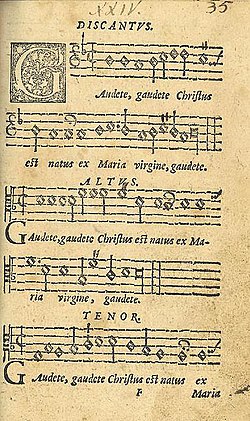
Gaudete (English: /ɡɔːˈdiːtiː/ gaw-DEE-tee or English: /ɡaʊˈdeɪteɪ/ gow-DAY-tay, Ecclesiastical Latin: [ɡau̯ˈdete]; "rejoice [ye]" in Latin)[a] is a sacred Christmas carol, thought to have been composed in the 16th century. It was published in Piae Cantiones, a collection of Finnish/Swedish sacred songs published in 1582. No music is given for the verses, but the standard tune comes from older liturgical books.
The Latin text is a typical medieval song of praise, which follows the standard pattern for the time – a uniform series of four-line stanzas, each preceded by a two-line refrain (in the early English carol this was known as the burden). Carols could be on any subject, but typically they were about the Virgin Mary, the Saints or Yuletide themes.
The complete text of "Gaudete", including the refrain:
| Latin | English |
|---|---|
| Gaudēte, gaudēte! Chrīstus est nātus Ex Marīā virgine, gaudēte! |
Rejoice, rejoice![a] Christ is born Of the Virgin Mary – Rejoice! |
| Tempus adest grātiae Hoc quod optābāmus, Carmina laetitiae Dēvōtē reddāmus. |
The time of grace has come— What we have wished for; Songs of joy Let us give back faithfully. |
| Deus homō factus est Nātūrā mirante, Mundus renovātus est Ā Chrīsto regnante. |
God has become man, With nature marvelling, The world has been renewed By the reigning Christ. |
| Ezechiēlis porta Clausa pertrānsitur, Unde lūx est orta Salūs invenitur. |
The closed gate of Ezekiel Is passed through, Whence the light is risen; Salvation has been found. |
| Ergō nostra cōntiō Psallat iam in lūstrō; Benedīcat Dominō: Salūs Regī nostrō. |
Therefore, let our assembly Now sing in brightness Let it bless the Lord: Greetings to our King. |